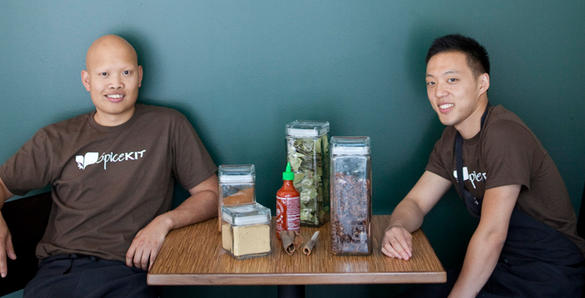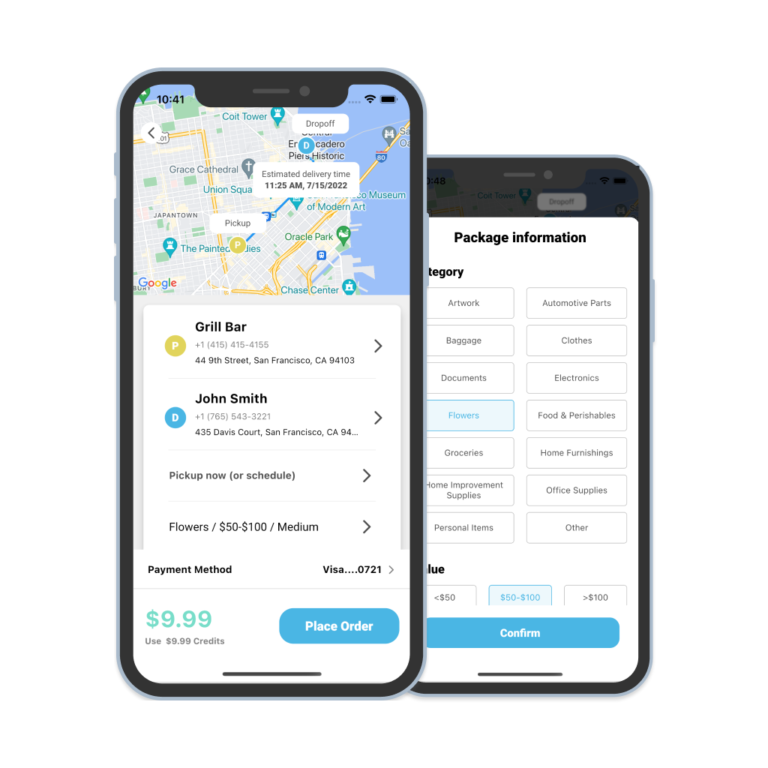Above: Spice Kit owners Fred Tang and Will Pacio
Nearly a decade ago, Fred Tang and Will Pacio were working hard in the world of fine dining at The Ritz Carlton Dining Room and The French Laundry. Meals were difficult to make, expectations were impossibly sky high, and above all else, joy was missing from the kitchen. Once the meaning behind the work-at-hand disappeared, the duo decided it was time for a change.
“We had this concept of putting together a professional restaurant,” said Tang. “Back in 2010, I think there wasn’t much like that, where we’re selling fast Asian street food to Financial District workers just to have a quick meal.”
A Novel Idea
San Francisco’s Financial District—a popular hub filled with corporate professionals hustling to stay on schedule—was lacking down-to-earth spots for a quick bite. The fine dining world Tang and Pacio vowed to leave behind is highly prevalent in the area. Yet Spice Kit made waves upon its opening, reminding the city that executives in suits still like affordable and tasty meals.
While the menu is small, the options for customizing orders are virtually limitless. Chicken, pork, ribs, and tofu can be added or swapped on a majority of items, including the Bánh mì, a short Vietnamese baguette. Korean wraps come ssäm style, meaning vegetables replace the standard bun. And the rice bowls offer customers something light to avoid any post-meal lethargy leading into afternoons.
Success from the 2010s Bay Area tech boom made it possible for Spice Kit to thrive. Now, COVID-19 is attempting to pummel the lunch spot into submission.
Surviving the New Normal
“Every year, we were profiting, and then COVID came and it literally just sucked all the life out of this restaurant,” said Tang. “So downtown, I think we got hit the hardest due to our customers being Financial District workers, all the offices being shut down due to COVID-19. Yeah. It’s been super rough. You know, we shut down for two months, for now, just trying to gain ground again.”
Tang and Pacio’s brilliant bet on higher-earning professionals in the Financial District is now backfiring. More people are working remotely in the wake of the pandemic. Since customer relationships are harder than ever to maintain, the restaurant is trying to look outside of its usual target audience.
“That’s the only thing that we can do right now, is try to keep the hospitals and healthcare workers and whoever else gets food, but the problem is trying to get into these [places]. You know, try getting to this hospital through another party,” said Tang.
Serving first responders carries clear advantages for restaurants like Spice Kit. They’re one of the few groups of people consistently working outside of the home in recent weeks. Plus, the tactic is useful for constructing a brand identity around dependability when consumers are looking for it almost everywhere they go.
But more restaurants in town are also trying to serve healthcare workers, creating more competition among local businesses. Considering the stress and conditions of their work, healthcare workers may not go out of their way to place catering orders often. The challenge of attracting more customers in a secured environment filled with other dining options is making it harder for restaurants like Spice Kit to survive.
To Third Party, or Not to Third Party
Challenges stemming from delivery apps are also causing Tang to think differently about third-party partners. Spice Kit is located outside the radius that partners like Uber Eats and DoorDash deliver to, which makes the restaurant less visible to potential customers. So the further away a customer is when orders from any restaurant, the harder it is to keep food fresh on the way to its final destination. But this issue becomes more than a logistics problem.
“Even though San Francisco made a rule that they can only take 15 percent as of right now during COVID-19, I think, you know, moving forward, the general public should definitely order through the restaurant and not food from third party vendors.”
San Francisco Mayor London Breed set a delivery fee cap of 15 percent for third-party delivery platforms in April. While this move has benefited San Francisco restaurants like The New Spot on Polk, Tang still acknowledges the additional consequences restaurants face when their margins are slashed.
According to Restaurant Business Online, U.S. restaurants have seen sales decline more than 50 percent during the pandemic. And because sales have plummeted, restaurant owners like Tang believe they can’t afford to miss out on any margins that could take them out of business.
This has led many restaurants down a dangerous path of decisions that must be made for better and worse. And with an end to the pandemic still in limbo, more challenging decisions promise to demand owners’ attention.






Your article made me suddenly realize that I am writing a thesis on gate.io. After reading your article, I have a different way of thinking, thank you. However, I still have some doubts, can you help me? Thanks.
Reading your article helped me a lot and I agree with you. But I still have some doubts, can you clarify for me? I’ll keep an eye out for your answers.